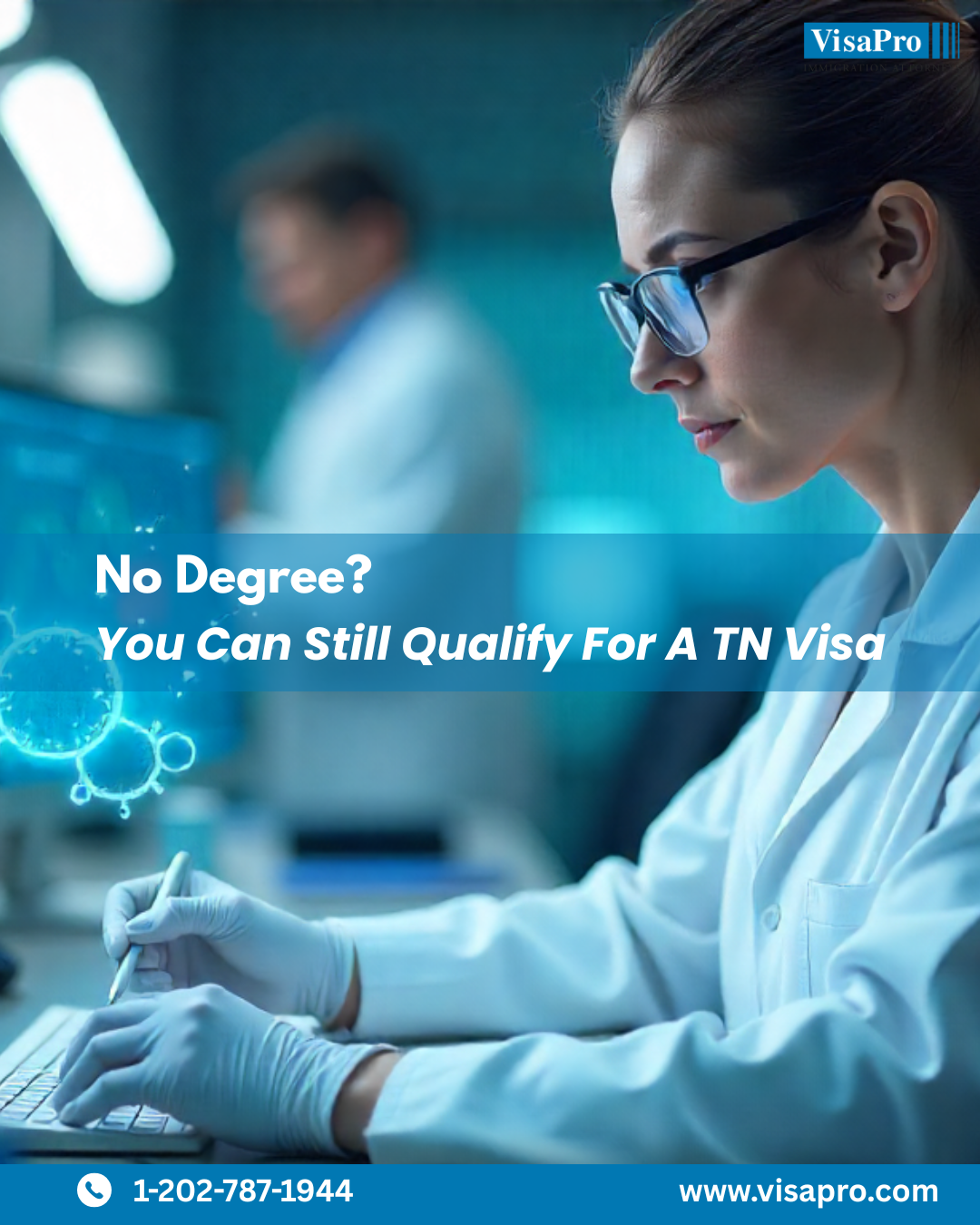Quick Summary:
Worried you can’t qualify for a TN visa as a Scientific Technician or Technologist without a 4-year degree? You’re not alone, and the good news is: it’s still possible. This guide walks you through how to meet the TN Scientific Technician requirements using a combination of training and experience, with practical tips, real-world examples, and expert insights that can ease your path forward.
What It Really Takes To Qualify As a TN Scientific Technician Without a Bachelor’s Degree
You can qualify for a TN Scientific Technician or Technologist visa without a 4-year degree if you have at least two years of relevant post-secondary education plus supporting experience.
Immigration officers assess this category closely, so your documentation must be comprehensive and well-organized.
While most TN visa professions require a bachelor’s degree or higher, the Scientific Technician/Technologist category is one of only three TN occupations that do not. But that doesn’t make it easier, it just means different requirements. Your eligibility depends on:
- Two or more years of theoretical training in a relevant field (i.e., agricultural sciences, astronomy, biology, chemistry, engineering, forestry, geology, geophysics, meteorology, or physics)
- Documented, practical experience that supports your role
- A job offer from a U.S. employer that aligns with a professional’s work in science or engineering under a supervising professional
Let’s explore how to make a strong case without a bachelor’s degree.

Understanding the Scientific Technician TN Visa Requirements for Those Without a Degree
The Scientific Technician TN visa requirements include a combination of academic training (minimum two years) and practical work experience in the specified scientific or engineering-related field.
No bachelor’s degree is needed, but documentation must be airtight.
This visa category often confuses both applicants and employers. Unlike engineers or chemists who simply present a degree, Scientific Technicians must build a narrative: how their training and experience qualify them for this role under NAFTA (now USMCA).
Key Requirements You Must Meet:
- Education: At least 2 years of post-secondary education in a relevant program (e.g., agricultural sciences, astronomy, biology, chemistry, engineering, forestry, geology, geophysics, meteorology, or physics)
- Experience: Job experience directly related to the field, often under the supervision of a degreed professional
- Supervision: Must be coming to work in support of a professional in one of the qualified fields (agricultural sciences, astronomy, biology, chemistry, engineering, forestry, geology, geophysics, meteorology, or physics)
- Job Offer: A formal offer letter that clearly describes the technical nature of the role and how it supports scientific professionals
Example:
Diego, a Canadian citizen, completed a two-year chemical technology diploma and worked for three years as a lab technician. His TN visa was approved after he submitted his diploma, work reference letters, and a detailed job offer explaining his duties and indicating he would be working under a PhD chemist in the U.S.
How To Document Your Education and Experience Effectively
You must submit post-secondary transcripts, diplomas, or certificates showing at least two years of theoretical training, alongside employment letters and/or a résumé proving your field-specific experience.
U.S. Customs and Border Protection officers rely heavily on documentation to make decisions in this category. If you don’t have a four-year degree, your supporting materials must paint a complete and credible picture.
Checklist of Required Documents:
- Official diploma or certificate from a recognized technical college or institute
- Transcript detailing coursework in relevant scientific/technical subjects
- Letter(s) from previous employers explaining your job role, responsibilities, and duration
- Updated résumé highlighting your technical skills and experience
- TN visa support letter from the U.S. employer detailing how your role will support scientific professionals in the U.S.
Case Example:
Maya had a two-year diploma in mechanical engineering technology from a Canadian college and 5 years of CAD design experience under a licensed engineer. Her TN application was approved after including her employer’s detailed job description and her college transcript.
Tip: Ask your current or former supervisors to emphasize how your role involved applied scientific principles and was performed under the direction of a degreed professional.

Crafting a Job Offer That Supports Your TN Visa Case
The job offer must clearly state that the role is technical in nature, supports a degreed professional in science or engineering, and fits the TN Scientific Technician or Technologist category.
Your future employer’s support letter is one of the most critical documents. Officers look closely at job titles, descriptions, and reporting structure. Vague or overly generic job letters are common reasons for denial.
Strong Job Offer Should Include:
- A Job title that reflects technical or scientific work (e.g., “Engineering Technologist,” “Chemical Lab Technician”)
- Duties that involve applied scientific knowledge and technical skills
- Confirmation that you report to and support a qualified professional (e.g., engineer, chemist, biologist, etc.)
- Statement that the position aligns with the TN classification as Scientific Technician or Technologist
Sample Statement:
“The position offered involves assisting our lead civil engineer with soil sampling, data collection, and lab analysis using ASTM methods. The role requires advanced technical skills in geotechnical testing, acquired through post-secondary education and 4+ years of relevant experience.”
Common Pitfalls That Lead to TN Visa Denials and How To Avoid Them
Incomplete documentation, vague job duties, or misalignment with the TN occupational list can result in TN denials, even for well-qualified applicants.
TN Scientific Technician applications are among the most scrutinized at the border. Officers are trained to distinguish this classification from general labor or technician jobs. Here’s what to watch out for.
Common Mistakes:
- Submitting job offers that resemble general labor or non-technical roles
- Failing to prove the work supports a degreed professional in a scientific field
- Assuming experience alone can replace required post-secondary education
- Applying without a clear job title or description in line with TN visa standards
Real Case:
Liam had 10 years of experience as an electronics technician but lacked formal post-secondary education. His TN application was denied because he couldn’t prove two years of relevant theoretical training, despite strong experience.
Avoid This: Never assume experience alone is enough. Officers want to see education plus experience in a technical and supervised scientific role.
How Work Experience and Vocational Training Can Meet TN Criteria
Yes, vocational diplomas or technical certifications can qualify, if paired with relevant job experience and clear links to applied science or engineering.
If your background includes a vocational college diploma or non-university certification, don’t worry- you can still qualify. But it must be directly relevant to your TN role.
Acceptable Forms of Education:
- Diploma in mechanical, chemical, or civil technology
- Certificate in engineering tech or applied sciences
- Trade school programs that include theoretical instruction (not just hands-on)
Experience That Can Help:
- Working in a laboratory under a degreed professional in one of the listed fields
- Supporting engineers on CAD design, fieldwork, or data analysis
- Maintaining scientific instruments or performing standardized testing procedures
Case Example:
Sophie completed a 2.5-year biomedical tech diploma and worked for four years in a hospital under supervision of licensed engineers. Her role involved calibrating medical equipment, documenting test results, and ensuring compliance with FDA protocols. Her TN was approved after submitting work letters and course descriptions.
When You Should Speak To a TN Visa Attorney (Hint: Probably Now)
If your educational background or work history doesn’t fit perfectly into a template, or if you’ve already been denied, consulting a TN visa attorney early can save time, money, and heartbreak.
Scientific Technician/Technologist TN visa cases don’t allow much margin for error. The standards are high and interpretations vary across border officers. Even one poorly written job description or missing document can derail an otherwise qualified application.
You should consult a TN visa attorney if:
- You don’t have a 4-year degree and are unsure if your training qualifies
- You’ve been denied a TN visa before
- Your job title or duties don’t clearly fit the TN list
- Your employer is unfamiliar with TN requirements
At VisaPro, we’ve helped hundreds of applicants like you navigate this exact challenge, and we can help ensure your petition is rock solid.
👉 Schedule your Free TN Visa Assessment now and find out exactly where you stand, no guesswork, no confusion.
Frequently Asked Questions (FAQ)
1. Can I get a Scientific Technician/Technologist TN visa without a degree?
Yes. A 4-year degree is not required, but you must show at least two years of post-secondary training or education in a relevant scientific or technical field, along with related work experience.
2.What are the scientific technician TN visa requirements?
The TN visa for Scientific Technicians requires (1) at least two years of relevant theoretical education, (2) work experience that supports the training, and (3) a job offer supporting a degreed science or engineering professional.
3.What is the difference between a scientific technician and a technologist for TN visa purposes?
There is no formal difference in the TN classification—both roles fall under the same category. However, “technologist” often implies slightly more advanced duties or specialization. The key factor is whether the role supports a degreed scientific professional.
4.Can experience substitute for education in a TN Scientific Technician application?
No. Experience alone is not enough. Immigration guidelines require a minimum of two years of theoretical post-secondary education or training, plus relevant experience.
5.What documents do I need to apply for a TN visa as a scientific technician or technologist?
You’ll need your diploma or transcript (showing 2+ years of education), work reference letters, a job offer letter that meets TN criteria, and a resume. The documentation must clearly demonstrate your training and technical support role.
Your Next Step: Let’s Get This Right, Together
You don’t have to navigate this complex TN process on your own. At VisaPro, we’re more than immigration experts, we’re partners in your journey. Whether you’re just exploring your options or facing a tough denial, we’re here to help you build a winning case.
👉 Contact VisaPro today for your FREE TN Visa Assessment
Let us help you turn your training and experience into a clear, confident path to work in the U.S.
What VisaPro Customers Are Saying
The US [B-1] Visa has always been a tough ride, and being denied a few times it makes it even worse. But thanks to VisaPro and their meticulous processing I was granted a Visa. I would like to thank you and all the people involved in making this a success. I would like to recommend VisaPro to all those who seek peace of mind and hassle free Visa processing.”



 Manas Bhat, Director Operations, First Houston Mortgage India
Manas Bhat, Director Operations, First Houston Mortgage India



